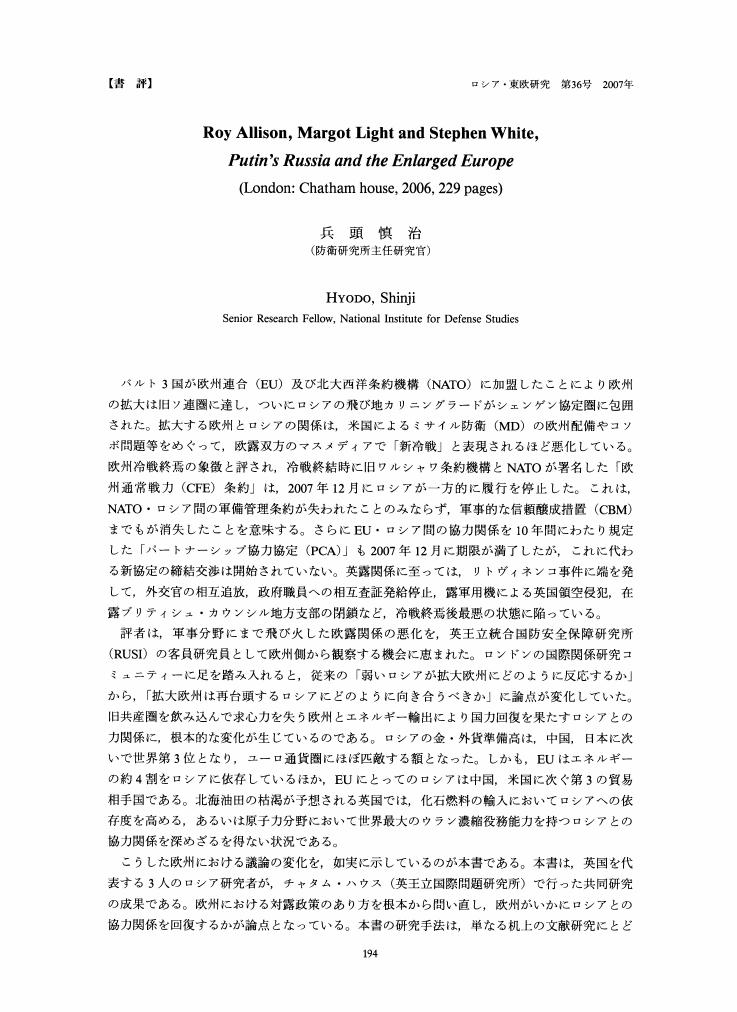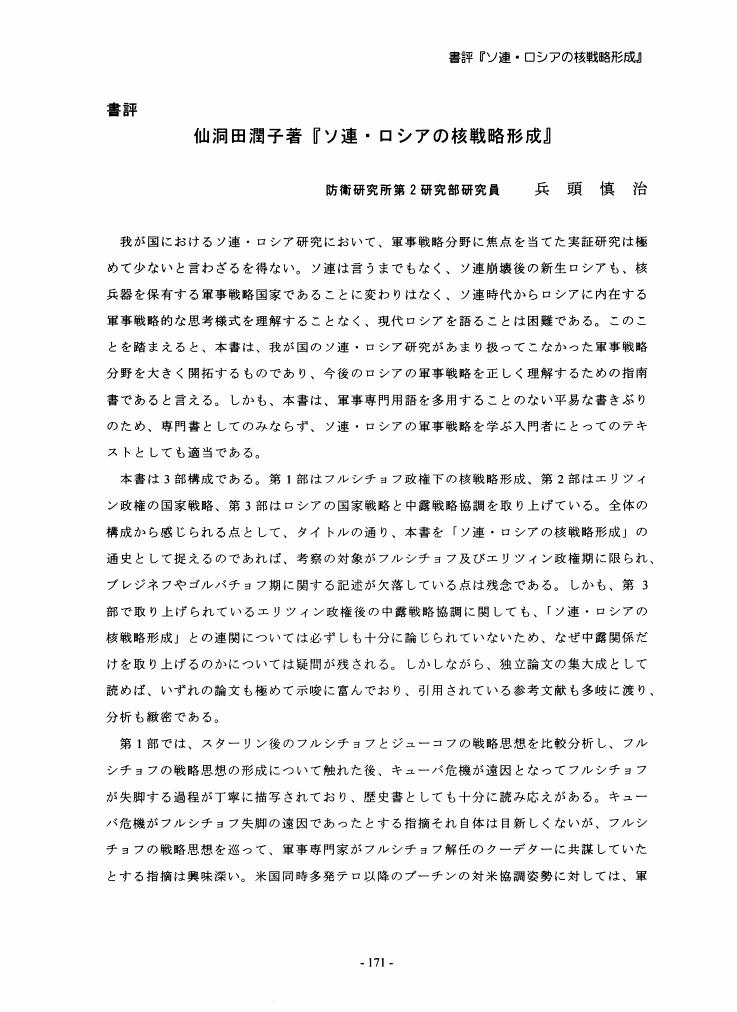256 0 0 0 OA ウクライナ危機をめぐる国際関係
3 0 0 0 OA プーチン大統領のリーダーシップ ―ロシアの対外強硬路線の行方―
- 著者
- 兵頭 慎治
- 出版者
- 国際安全保障学会
- 雑誌
- 国際安全保障 (ISSN:13467573)
- 巻号頁・発行日
- vol.46, no.1, pp.51-67, 2018-06-30 (Released:2022-03-14)
2 0 0 0 OA 2つのチェチェン紛争をめぐる交渉プロセス
- 著者
- 兵頭 慎治
- 出版者
- 国際安全保障学会
- 雑誌
- 国際安全保障 (ISSN:13467573)
- 巻号頁・発行日
- vol.33, no.1, pp.29-49, 2005-06-30 (Released:2022-04-24)
- 著者
- 兵頭 慎治 神田 英宣
- 出版者
- 防衛省防衛研究所
- 雑誌
- 防衛研究所紀要 (ISSN:13441116)
- 巻号頁・発行日
- vol.17, no.2, pp.59-95, 2015-02
1 0 0 0 OA 小泉直美著『ポスト冷戦期におけるロシアの安全保障外交』 (志學社,2017年,257頁)
- 著者
- 兵頭 慎治
- 出版者
- ロシア・東欧学会
- 雑誌
- ロシア・東欧研究 (ISSN:13486497)
- 巻号頁・発行日
- vol.2017, no.46, pp.132-134, 2017 (Released:2019-02-01)
- 著者
- 兵頭 慎治
- 出版者
- ロシア・東欧学会
- 雑誌
- ロシア・東欧研究 (ISSN:13486497)
- 巻号頁・発行日
- vol.2015, no.44, pp.132-134, 2015 (Released:2017-08-18)
1 0 0 0 OA 乾一宇著『力の信奉者ロシア その思想と戦略』
- 著者
- 兵頭 慎治
- 出版者
- ロシア・東欧学会
- 雑誌
- ロシア・東欧研究 (ISSN:13486497)
- 巻号頁・発行日
- vol.2011, no.40, pp.91-93, 2011 (Released:2013-05-31)
1 0 0 0 OA 金融・経済危機がロシアの内政・外交に与えた影響
- 著者
- 兵頭 慎治
- 出版者
- The Japanese Association for Russian and East European Studies
- 雑誌
- ロシア・東欧研究 (ISSN:13486497)
- 巻号頁・発行日
- vol.2009, no.38, pp.17-29, 2009 (Released:2011-10-14)
This article examines how the global financial and economic crisis and the accompanying change in international oil prices have affected Russia’s internal and external affairs, especially the tandem system of governance and its foreign policy towards East Asia. Because this crisis was not foreseen when the tandem administration was introduced, at present, political stability is suffering from poor crisis management. While it cannot be said that the tandem system has been fundamentally damaged, judging from the fact that Prime Minister Putin is increasingly adopting a hands-on approach, the probability that he will be back as President in the coming presidential election is growing. Though not proved, Russia’s assertive foreign policy largely depended on the high international oil prices before the Georgian conflict. Whether Russia likes it or not, after the global financial and economic crisis, Russia has to tap East Asia to recover its economic growth by exporting more energy products to the emerging new markets there. However, we should not overestimate this trend as East Asia is not Russia’s top-most foreign policy priority, and Russia does not accord that much strategic importance to East Asia. Because Russia’s national goal for 2020, as stated in “National Security Strategy through to 2020 of Russian Federation,” is continued economic growth so as to become the fifth-largest economy in the world, it is much more important—after this crisis—to pay attention to the correlation between economic and political factors using the interdisciplinary method.
- 著者
- 兵頭 慎治
- 出版者
- The Japanese Association for Russian and East European Studies
- 雑誌
- ロシア・東欧研究 (ISSN:13486497)
- 巻号頁・発行日
- vol.2007, no.36, pp.194-196, 2007 (Released:2010-05-31)
- 著者
- 兵頭 慎治
- 出版者
- The Japanese Association for Russian and East European Studies
- 雑誌
- ロシア・東欧研究 (ISSN:13486497)
- 巻号頁・発行日
- vol.2005, no.34, pp.174-176, 2005 (Released:2010-05-31)
- 著者
- 兵頭 慎治
- 出版者
- ロシア・東欧学会
- 雑誌
- ロシア・東欧研究 (ISSN:13486497)
- 巻号頁・発行日
- vol.2004, no.33, pp.129-133, 2004 (Released:2010-05-31)
1 0 0 0 OA 仙洞田潤子著『ソ連・ロシアの核戦略形成』
- 著者
- 兵頭 慎治
- 出版者
- ロシア・東欧学会
- 雑誌
- ロシア・東欧研究 (ISSN:13486497)
- 巻号頁・発行日
- vol.2001, no.30, pp.171-174, 2001 (Released:2010-05-31)
1 0 0 0 OA 現代ロシアにおける中央と地方の関係 ~権限区分条約を中心として~
- 著者
- 兵頭 慎治
- 出版者
- ロシア・東欧学会
- 雑誌
- ロシア・東欧学会年報 (ISSN:21854645)
- 巻号頁・発行日
- vol.1999, no.28, pp.100-107, 1999 (Released:2010-05-31)
- 参考文献数
- 23
1 0 0 0 OA ロシア極東地域主義
- 著者
- 兵頭 慎治
- 出版者
- ロシア・東欧学会
- 雑誌
- ロシア・東欧学会年報 (ISSN:21854645)
- 巻号頁・発行日
- vol.1995, no.24, pp.126-133, 1995 (Released:2010-05-31)
- 参考文献数
- 29
1 0 0 0 OA Dmitri Trenin, Should We Fear Russia?
- 著者
- 兵頭 慎治
- 出版者
- 国際安全保障学会
- 雑誌
- 国際安全保障 (ISSN:13467573)
- 巻号頁・発行日
- vol.45, no.1, pp.131-135, 2017-06-30 (Released:2022-04-01)
1 0 0 0 OA 序論―ロシアの国家安全保障政策
- 著者
- 兵頭 慎治
- 出版者
- 国際安全保障学会
- 雑誌
- 国際安全保障 (ISSN:13467573)
- 巻号頁・発行日
- vol.39, no.1, pp.1-11, 2011-06-30 (Released:2022-04-14)
- 著者
- 兵頭 慎治
- 出版者
- 国際安全保障学会
- 雑誌
- 国際安全保障 (ISSN:13467573)
- 巻号頁・発行日
- vol.35, no.1, pp.115-132, 2007-06-30 (Released:2022-04-20)
1. ヒトにおける子宮内膜内Side population cellの発現と着床不全との関連性についてヒトの子宮内膜においてもSide population cellの発現はマウスと同じように変化するのか。愛媛大学医学部附属病院産婦人科不妊外来受診患者および同院良性疾患手術患者より文書にて同意書を作成した上で子宮内膜および末梢血を採取し、それぞれに含まれるSide population cell数をフローサイトメトリーを用いて測定した。採取時期は月経期・卵胞期・黄体期にわけて採取した。また検体採取時に経膣超音波検査断層法を用いて子宮内膜の厚さを測定し、血漿中のEstradiolおよびProgesterone濃度をCLIA法にて測定した。それぞれの月経周期におけるSide population cellは子宮内膜上皮・子宮内膜間質・末梢血のいずれにおいても黄体期に高値を示した。しかしながら子宮内膜の厚さとSide population cellとの間には末梢血においては相関性がみられた(r^2=0.151,p<0.05)が子宮内膜上皮・子宮内膜間質においては相関性がみられなかった。さらに末梢血におけるSide population cellの数と血漿中のEstradiolおよびProgesteroneとの間に正の相関が認められた(r^2=0.171,p<0.05;r^2=0.218,p<0.01)。さらにフローサイトメトリーを用いて分離したSide population cellを10^8Mの17β-estradiolを含むDMEM/HamF12培地で培養し、7週間後には間質・上皮から分析したSide population cellから5cells/dishの間質細胞への分化が認められた。子宮内膜由来のSide population cellは、子宮内膜の増殖・分化に関与している可能性が考えられる。














